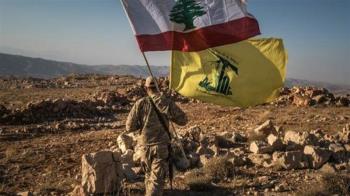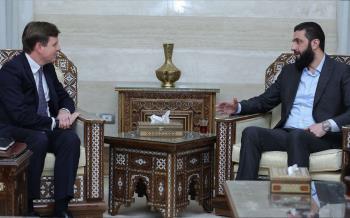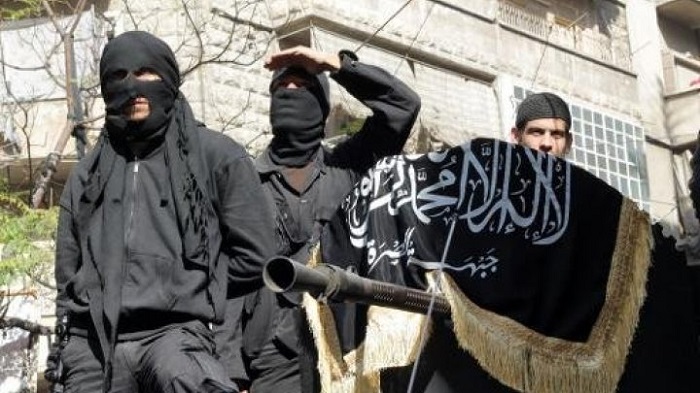Alwaght- Known as one of the strongest terrorist groups active in Syria, the al-Nusra Front has stated in a video statement which was read by its leader Abu Mohammad al-Julani that it officially split from Al-Qaeda, and that it changed name to Jabhat Fateh al-Sham- Front for the Conquest of the Levant.
During the video message it was the first time for the group’s leader al-Julani to appear in front of the camera while not veiled, and showing full face.
Al-Nusra Front announced existence in 2012 in Syria while gathering together a slew of Syrian and international fundamentalists, and it said that its major aim was to bring down the Syrian government, rather than expanding its terrorist activities to out-of-Syria regions like its former parent terror organization Al-Qaeda.
Focus on working only in Syria instead of carrying out attacks in an international level is the most significant distinction point between al-Nusra Front and ISIS terror group. This issue has kept the two terrorist groups from uniting their forces despite the fact that they strove after the same aim in Syria.
On the other side, armed and terrorist-style fighting against Damascus government as a primary goal of the group called attention of such anti-Syrian countries as Turkey and Qatar which for years went to great lengths to remove from power the Syrian President Bashar al-Assad.
However, since its establishment al-Nusra Front was under pressures coming from the supporting countries to cut off its bonds to Al-Qaeda in Syria or hide them. Since the beginning, Turkey and Qatar believed that cutting open relations with Al-Qaeda would buy credibility for the terrorist group, and so to a degree make foreign supports for it justifiable.
Although the recent battlefield developments and considerable advances of the Syrian army and its backers from the Resistance Axis are considered as the most significant pushes behind tactical and ostensible changes inside al-Nusra Front's structure, this move in the eyes of its leaders takes place with a couple of objectives.
Elimination of Al-Qaeda name would, the leaders think, help the terrorist group win credit. Actually, earlier al-Nusra Front carried a link to key parent terrorist group, something that brought forth disgrace and notoriety for it even if it conducted no terrorist attacks. But a black record of the group which included terrorist assaults and inhuman blasts especially in Aleppo in northern Syria would draw attention to its past works no matter what name it chooses for itself. In fact, even with a new name it is impossible for the foreign-backed group to conceal its past terror acts.
On the other hand, perhaps al-Nusra Front came up with the idea that openly announcing breakaway from Al-Qaeda would reduce limits and even increase foreign supports for its activities inside Syria, however, the regional equations in no way are supporting this idea. While the Syrian army every single day is tightening its encirclement of Aleppo as stronghold of al-Nusra Front in Syria, the domestic developments of Turkey following the attempted coup hardly allow foreign supports for the Ankara-backed rebel groups fighting the Syrian government like the earlier times. According to many experts, following the failed coup bid in Turkey, the government of President Recep Tayyip Erdogan focused its energy on firming up stability at home rather than engaging in regional cases. For al-Nusra Front, this means drop in once active role of one of its important supporters in Syria.
Another possible issue that allured al-Nusra Front into splitting from its parent terrorist group is a hope for being excluded from airstrikes by Russia and the US against groups that are jointly labeled by Moscow and Washington as terrorist groups. Since making up the common list of the terrorist groups in Syria, the positions of al-Nusra Front in Aleppo have repeatedly been major targets for air raids conducted by fighter jets of the Russian air force. Now with this split, the leaders of once Al-Qaeda’s affiliate are optimistic that their group can be removed for the terrorist groups blacklist, something highly unlikely. So far, no signs appeared to signal that the players relevant to Syria crisis are now convinced to change view on the terrorist group.
In fact, Russian opposition to the group and its bombing of the group’s positions across Syria are not because of its name but because of its tendencies and hostility to the Syrian government. So, it is not expected that Russian and Syrian leaders change mind on striking the terrorist group while it has only changed its name and kept in place its tendencies and ideas on the Syrian government. Additionally, the Russian foreign ministry asserted that no matter what another name al-Nusra Front chose for itself, it would remain an illegal and terrorist group, with its major aim being forming the so-called Islamic caliphate using heinous ways. The Russian foreign ministry added that fighting against those radical elements would continue until their obliteration in association with the international community. This stance by Moscow makes it perfectly clear that it is not going to shift view on al-Nusra Front even if the terrorist group changes name, publicizes its leader, and breaks away from Al-Qaeda.
By doing so, perhaps al-Nusra Front seeks to display itself as more practical than ever, and make its way to a future that day by day is going dark to the terrorist groups in Syria. Existence of the fundamentalists who primarily kept in mind foundation of Islamic caliphate in Syria prevents an essential transformation of al-Nusra Front after changing its name. Furthermore, such a breakaway from Al-Qaeda could make the terrorist group lose elements who are discontented with split from the parent group, something that could cause further defections inside the group, and send it increasingly weaker as it swings with an uncertain aim between striving after an Islamic caliphate or a civilian government.



























